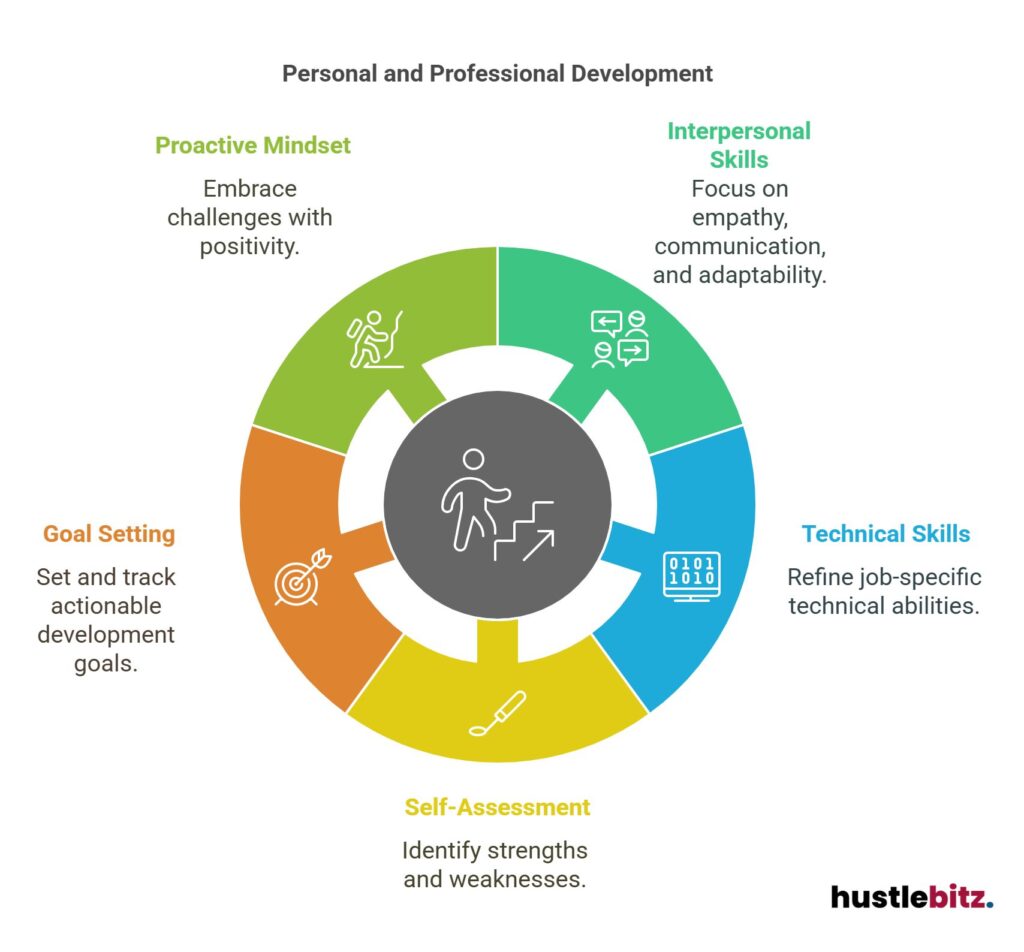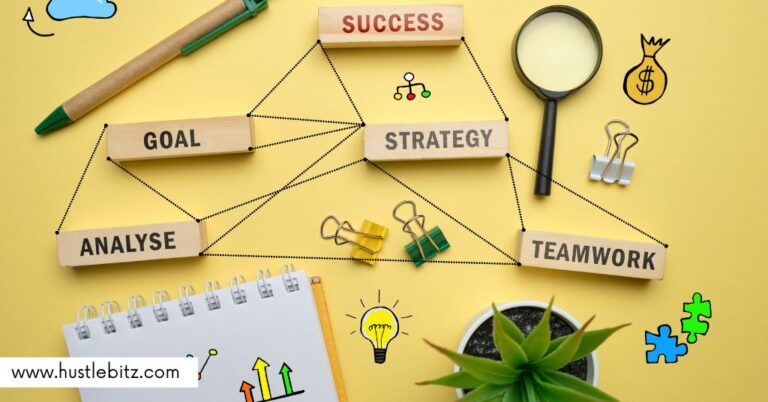Honing the right skills is crucial for success in today’s competitive landscape. Focus on a blend of technical proficiency and soft skills, as both are increasingly valued. Interpersonal skills, adaptability, and critical thinking are essential for navigating complex work environments. Moreover, emotional intelligence fosters collaboration and innovation. Engage in self-assessment to identify your strengths and weaknesses, guiding your skill enhancement efforts. Setting actionable goals and committing to continuous learning will keep you aligned with industry demands. To better understand how to effectively refine your skills, consider exploring the various avenues that can lead to professional growth.
Key Takeaways
- Assess your interpersonal and soft skills, such as empathy, communication, and adaptability, which are increasingly valued in today’s complex work environments.
- Continuously refine your technical skills relevant to your field, ensuring you can execute job-specific tasks effectively.
- Engage in self-assessment to identify your strengths and weaknesses, guiding your skill enhancement and personal growth strategy.
- Set actionable goals based on your self-assessment to target specific areas for development and track your progress regularly.
- Embrace a proactive mindset and a positive attitude towards challenges, as these traits are crucial for navigating change and fostering innovation.

Essential Skills for a Thriving Career: Are You on the Right Path?
In today’s competitive job market, honing essential skills is critical for navigating a successful career trajectory and ensuring long-term professional growth. The skills you need to succeed extend beyond technical knowledge; they encompass a range of interpersonal and cognitive abilities that facilitate effective communication and collaboration in diverse environments.
Interpersonal skills are paramount in fostering relationships with colleagues, clients, and stakeholders. The ability to empathize, listen actively, and communicate clearly is fundamental in creating a positive work atmosphere and enhancing teamwork. As organizations increasingly value collaborative efforts, these skills become indispensable assets.
Adaptability and resilience are also crucial in today’s fast-paced and ever-evolving work landscape. Professionals must be prepared to adjust to new challenges and shifts in their industry. The capacity to remain focused and maintain a positive attitude in the face of adversity is vital for overcoming obstacles and seizing opportunities.
Additionally, problem-solving skills are at the heart of innovation and efficiency. The ability to analyze situations, identify potential solutions, and implement effective strategies is essential for driving progress within an organization. As complexities arise, the capability to think critically and creatively will set you apart from your peers.
Technical Proficiency vs. Soft Skills: Finding the Right Balance for Success
Striking the right balance between technical proficiency and soft skills is essential for professionals aiming to excel in today’s dynamic workplace. Technical skills, such as data analysis, programming, or specialized knowledge in a particular field, are undoubtedly critical for executing job-specific tasks.
However, the increasing complexity of work environments necessitates a strong emphasis on soft skills, which include communication skills, problem-solving abilities, and adaptability.
Effective communication skills enable professionals to articulate ideas clearly and foster collaboration among team members. In many instances, the ability to convey complex technical concepts in an understandable manner can set one apart from peers.
Furthermore, problem-solving skills are vital as they empower individuals to navigate unforeseen challenges and devise innovative solutions in high-pressure situations.
Adaptability, another crucial soft skill, allows professionals to adjust to ever-evolving technologies and workplace dynamics. As industries transform rapidly, those who can embrace change and learn new tools or processes will remain competitive and relevant.
Ultimately, achieving success in today’s workplace is not solely dependent on technical expertise; it requires a harmonious integration of both technical proficiency and soft skills. While the former lays the groundwork for task execution, the latter enhances interpersonal relationships and fosters a collaborative work environment.
Therefore, professionals should strive to hone both skill sets, ensuring they are well-equipped to meet the demands of their roles and contribute meaningfully to their organizations.
Embracing Adaptability and Innovation

A key factor in achieving long-term success is the ability to embrace adaptability and foster innovation in response to rapidly changing market conditions. In today’s fast-paced environment, professionals must actively adapt to new technologies and methodologies to stay relevant. This adaptability is not merely a reaction; it requires a proactive willingness to learn and grow.
Technological innovation is reshaping industries, demanding that individuals cultivate critical thinking skills to analyze and implement these advancements effectively. By honing these skills, one can approach challenges with a fresh perspective, identifying opportunities where others may see obstacles.
Moreover, emotional intelligence plays a crucial role in this process. Understanding and managing one’s emotions, as well as empathizing with others, enhances collaboration and fosters a culture of innovation within teams.
The intersection of adaptability and innovation also encourages a mindset that welcomes change rather than fears it. Professionals who can pivot in response to new information and shifting circumstances are better equipped to lead their organizations through uncertainty. This not only enhances personal resilience but also positions teams to leverage collective strengths in addressing challenges.
Refining Strategic Thinking and Problem-Solving Abilities

Refining strategic thinking and problem-solving abilities is essential for navigating complex challenges in today’s dynamic work environment. These skills are not merely advantageous; they are critical for effective decision-making and fostering innovation within organizations. Professionals who cultivate these capabilities can better anticipate shifts in the market, identify opportunities, and devise solutions that drive success.
To enhance your strategic thinking and problem-solving skills, consider focusing on the following areas:
- Critical Analysis: Develop the ability to break down complex problems into manageable components. This will allow you to evaluate information and make informed decisions efficiently.
- Scenario Planning: Engage in exercises that encourage you to consider various potential outcomes. By envisioning different scenarios, you can prepare for uncertainties and devise contingency plans.
- Effective Communication: Hone your ability to communicate ideas clearly and persuasively. This ensures that your strategic thoughts are understood and embraced by stakeholders, fostering collaboration and collective problem-solving.
Fostering a Robust Professional Network

Building on the importance of strategic thinking and problem-solving, fostering a robust professional network is vital for career advancement and access to new opportunities. Developing a network is not merely about collecting contacts; it involves cultivating relationships that can provide support and guidance throughout one’s career journey. The skills needed to build trust and rapport with others are essential in creating a network that can contribute to career success.
A strong professional network enhances teamwork and collaboration, allowing for the exchange of ideas and resources that can lead to innovative solutions. Engaging with diverse individuals enriches your perspective and helps in navigating complex challenges.
| Networking Elements | Skills Needed | Impact on Career Success |
| Building Trust | Active Listening | Strengthened Relationships |
| Collaboration | Effective Communication | Enhanced Teamwork |
| Ongoing Engagement | Emotional Intelligence | Increased Opportunities |
This table illustrates that the elements of networking not only rely on interpersonal skills but also significantly impact your career trajectory. By prioritizing these relationships, you contribute to a supportive ecosystem that fosters growth and knowledge sharing. Ultimately, a robust professional network is a cornerstone of career success, enabling you to seize opportunities while ensuring you remain adaptable to the evolving professional landscape.
Are You Aligning with Industry Evolution?

Staying attuned to industry evolution is crucial for professionals seeking to maintain relevance and capitalize on emerging opportunities. As the landscape of various industries continues to evolve, it is essential to align your skills and abilities with current demands. Employers are increasingly seeking candidates who can adapt and thrive in this fast-paced environment.
To effectively align with industry evolution, consider focusing on the following skills:
- Adaptability: The ability to manage change and pivot when necessary is highly sought after by employers. Embracing new challenges with a positive mindset allows for personal and professional growth.
- Continuous Learning: In an age of rapid technological advancements, the ability to learn new skills is vital. Engaging in professional development through courses, workshops, and networking can enhance your expertise and keep you competitive.
- Organizational Skills: Effective organizational skills are essential in managing tasks and projects efficiently. Professionals who can prioritize their workload and streamline processes are invaluable assets to any team.
The Significance of Self-Assessment in Perfecting the Skills for Success

Self-assessment serves as a crucial tool for individuals aiming to identify their strengths and weaknesses, ultimately guiding the continuous improvement of their skills for success.
By engaging in reflective practices, individuals can gain insight into their current skill set, which is essential for adapting to the evolving demands of the workplace. This process allows one to recognize not only areas of proficiency but also gaps that require attention.
In today’s competitive job market, employers want candidates who demonstrate a commitment to personal growth and development. Self-assessment enables professionals to align their competencies with the skills for success that are most sought after in their industry. By understanding the specific attributes that employers value, individuals can tailor their learning and development efforts to enhance their marketability.
Career advice often emphasizes the importance of setting actionable goals based on self-assessment outcomes. This proactive approach encourages individuals to devise targeted strategies for skill enhancement, whether through formal education, mentorship, or practical experience. As a result, self-assessment not only fosters personal accountability but also enables individuals to track their progress over time.
Ultimately, the significance of self-assessment lies in its ability to empower individuals to take charge of their professional journey. By continuously refining their skill set, they can better position themselves for success and create opportunities that align with their career aspirations.
In this way, self-assessment becomes an indispensable component of lifelong learning and achievement.
Final Thoughts
In today’s dynamic and competitive professional landscape, the continuous refinement of your skill set is not just beneficial—it’s essential. By focusing on a balanced approach that includes technical expertise, soft skills, adaptability, and strategic thinking, you position yourself for long-term success. Embracing continuous learning, self-assessment, and networking will keep you aligned with industry evolution and open doors to new opportunities. Remember, the journey of professional growth is ongoing, and by staying committed to enhancing your skills, you ensure that you remain competitive and prepared to navigate the complexities of the modern workplace.




